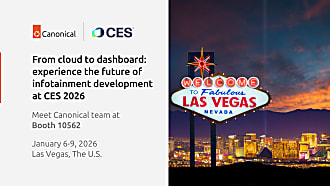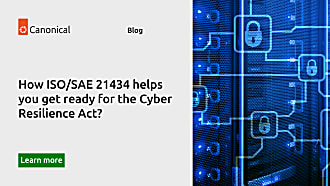Bertrand Boisseau
on 9 July 2025
Raising the bar for automotive cybersecurity in open source – Canonical’s ISO/SAE 21434 certification
Cybersecurity in the automotive world isn’t just a best practice anymore – it’s a regulatory imperative. With vehicles becoming software-defined platforms, connected to everything from mobile phones to cloud services, the attack surface has expanded dramatically. The cybersecurity risk is serious, and concrete. And with regulations like UNECE R155 making cybersecurity compliance mandatory, the automotive industry needs suppliers it can trust.
Canonical’s processes are now officially ISO/SAE 21434 certified. That’s a big deal for us, and for the broader ecosystem of automakers, Tier 1s, and software developers building the vehicles of tomorrow. Let’s break down what this means, why it matters, and what comes next.

What the certification covers
ISO/SAE 21434 is the international gold standard for cybersecurity risk management across a vehicle’s lifecycle. Our certification covers the development of Ubuntu and related tooling, including the packaging and maintenance of open source software.
ISO/SAE 21434 is a rigorous review of our processes, supply chain security, documentation, tooling, and development practices. The certification required a review of everything from how we handle upstream patches to how we respond to CVEs – checking that everything is designed to ensure that our software can be safely used in production automotive environments.
This achievement was years in the making, and represents a major investment in aligning our development lifecycle with the needs of regulated industries.
Why it matters
This answers a basic question for OEMs and Tier 1 suppliers: Is open source software capable of meeting cybersecurity requirements for use in automobiles? With Canonical’s ISO/SAE 21434 certification, the answer is clear: yes.
You get the velocity, transparency, and flexibility of open source – backed by processes that meet the strictest standards in the industry.
In particular, the certification reinforces that open source software can meet the same high standards of cybersecurity as proprietary alternatives. With ISO/SAE 21434 certification in place, there’s no structural reason preventing open source from being used in modern automotive systems – especially in the context of software-defined vehicles (SDVs), where ease of modification, modularity, and freedom from dependency are essential. Canonical’s approach proves that open source can deliver the same level of assurance required by the industry’s most demanding security frameworks.

Consolidated Vehicle Server Architecture illustration
What it unlocks
This certification clears the road ahead for automotive-grade open source.
- Teams evaluating Ubuntu for in-vehicle systems or automotive tooling no longer need to audit our processes from scratch, enabling faster integration.
- Canonical now formally meets the cybersecurity expectations of OEMs operating under UNECE R155, offering assurance in procurement.
- We support threat modeling, vulnerability handling, and supply chain traceability aligned with ISO/SAE 21434 – giving you a standardized approach to risk management.

What’s next?
Canonical’s certification is a major step in our broader journey to deliver automotive-grade open source solutions. As the industry increasingly moves toward SDV architectures, we are continuing to invest in initiatives around software quality, process maturity, and functional safety readiness.
Our next efforts will further support OEMs and Tier 1s in their compliance and product quality goals – including areas like qualification, code analysis, and robust testing strategies.
With ISO/SAE 21434 now in place, we’re doubling down on our commitment to make open source the most trusted option for next-generation vehicles. For more of an insight, read our blog on why Canonical has decided to join various consortiums.
Stay tuned, or reach out to our team to talk more about what Canonical can do for your vehicle programs.
Curious about Automotive at Canonical? Check out our webpage!
Want to learn more about software-defined vehicles? Download our guide!




